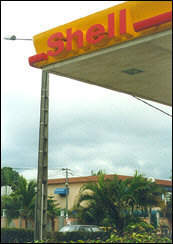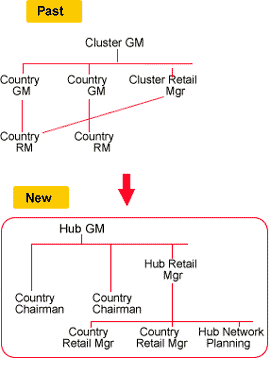 PROFILE PROFILE |
 THE HUB STORYLINE THE HUB STORYLINE |
Introduction

Shell has been active in West Africa for over 70 years with activities in the areas of retail, consumer markets, lubricants, LPG, aviation and marine. Currently Africa is seen, not only within Shell, as an area with vast business opportunities. The different economies are growing at high rates and the countries are becoming politically more and more stable.
Shell is committed to seize the opportunities that exist and that will develop over time in West Africa. This commitment is expressed by making available the necessary resources and funds to further expand our business. Over the past five years an amount of 200 million USD was invested in West Africa.
As an essential part of Shell's commitment to Africa and to increase the efficiency and successes in our operations in Africa, a new management structure is being put in place. This structure comprises three geographical areas called "Hub": North, East and West Africa Hubs. An African Executive Committee (AEC) - with Mr. Bernard Leyraud as a chairman - is heading these Hub's. The three Hub General Managers are members of the AEC.
The new management structure of each Hub is designed to be closer to our business and thereby serve our customers better. Furthermore, it ensures that learning experiences and best practices are fully shared throughout the region and that skills and competence development can be better co-ordinated.
This brochure outlines the organizational structure of the West Africa Hub and gives an overview of action plans that have been defined to make the Hub structure work in practice and deliver its promises.
 The West & central Africa Hub: Countries & indicators The West & central Africa Hub: Countries & indicators |
The West Africa Hub currently covers 17countries of which activities in Congo Brazzaville and the Democratic Republic of Congo are in the stage of starting up. In some West and Central African countries we are not present yet but we aim to establish one; Central African Republic and Mauritania. In other countries our activities have been temporarily suspended.
 The countries are characterized by the following key indicators (year 1998) The countries are characterized by the following key indicators (year 1998) |
see table
 The HUB Organization: Structure The HUB Organization: Structure |
The HUB organization structure builds on the successes of the three clusters in the area and is designed to further enhance our results. The new structure aims at serving our three main stakeholders in a better way:
Our customers through improved Shell customer offering, increased focus and security of supply
Our employees through offering more challenging development opportunities, more focus on competence development and performance management as well as of policies,
Our shareholder through creating an organization structure able to efficiently seize growth opportunities throughout the Hub.
The kick-off of the new structure implies that we are now managing our business in a different way and that the cluster structure has ceased to exist. Today, Hub wide, cross-border co-ordination and responsibilities are in place for retail, finance, human resource management, health, safety, environment and operations, lubricants, brand and communication as well as supply. Responsibility for commercial customers and staff issues, adherence to Shell's Business Principles, industry relations and co-ordination, execution of HSE plans remains local.
The essence of the transition from the old organization structure to the Hub is highlighted in the example below:

 The Management Team The Management Team |
General Manager
Peter Blauwhof Abidjan, Côte d'Ivoire |
Retail Manager
Paul Van Hoorn Currently Accra, Ghana |
Finance Manager
Bjom Fermin Accra, Ghana |
Country Chairman Senegal
Vincent Moolenaar Dakar, Senegal |
HR Manager
Benjamin Behi Abidjan, Côte d'Ivoire |
HSE Manager
Badaoui Tidjani Ndjamena, Tchad |
Country Chairman Côte d'Ivoire
Benjamin Behi Abidjan, Côte d'Ivoire |
Supply Manager
Théodore Akueson Abidjan, Côte d'Ivoire |
Lubs, Brand & Communication
Mamadou Niang Dakar, Senegal |
Country Chairman Ghana
Louis Van Eijk Accra, Ghana |
Business Enlargement
Manager Banji Ogungbemi Dakar, Senegal |
Operations Manager
Jean Pierre Rubio Abidjan, Côte d'Ivoire |
Country Chairman Cameroon
Anatole Yann Lisson Douala, Cameroon |
| NAME |
JOB TITLE AND MAIN RESPONSIBILITIES |
BASED IN |
Peter Blauwhoff
Hub General Manager |
Responsible for providing leadership and guidance in all aspects of the business in all countries of the Hub. Accountable for the overall results, for integrity of business controls, adherence to Shell's Business Principles and HSE standards. |
Abidjan |
Benjamin Behi
Country Chairman
Côte d'Ivoire |
Responsible for commercial activities, leading the local management team, interface with authorities and industry relations. |
Abidjan |
|
With the start of the West Africa Hub, the management team has formulated a clear and stretching Vision or aspiration. The purpose of this Vision is to clarify to all involved in which strategic direction the Hub will develop so that all resources can be efficiently aligned.
This stretching Vision is formulated as follows:
"To be the West Africa's leading oil company in market share and customer preference by the year 2000".
The Hub management team has identified a number of key issues have to be addressed in order to make the Hub structure a success. The relevant key issues are:
lack of a clear structure in the development of the competencies of our employees,
widely varying degrees of management of the performance of our employees and generally of too low quality,
too many HSE incidents, in particular related to road transport,
inconsistent use of the Shell brand throughout the Hub,
weak business controls and
insufficient management of accounts receivables.
These issues will be addressed together with other issues in the action plan highlighted below.
To realize our Vision and business aspirations is a formidable task which can be only achieved if all of us will change our ways of working. To this end, the Hub management team has started to develop an action plan which will help us to achieve our goals. The outline of the plan is summarized below indicating also what we commit ourselves to do or to achieve within a reasonable time frame. Underlying, more detailed, action plans with concrete milestones, resourcing and funding are currently under development.
| Competence skills development |
we will have the best staff in the industry
we will analyze individual development needs
we commit to develop staff to meet business needs by: coaching, on the job training, workshops, short term assignments and formal training
All staff will have clear, written tasks and business objectives end 1999
We guarantee a formal, individual performance review over 1999 and will progressively introduce quarterly performance reviews
Good performance will be rewarded
HSE management systems - including HSE cases
will be in place by the end of 1999
HSE management systems will be externally certified by the end of 2000
We will set standards for and select a limited number of transporters with whom we will develop a sustainable partnership
We will establish defensive driving schools and truck inspections centers throughout the Hub
| Consistent brand management |
We will have brand committees in place at the end of Q1 in every country
We will realize a brand share of preference of 3% over retail market share in every country by the end of 1999
We will achieve a consistent brand image throughout West Africa by the end of 1999
We will improve the business controls in the Hub with a focus on the weaknesses identified in the 1998 Letter of Representation checklist and audit reports
We will establish a Hub audit structure before mid 1999
Overdue/accounts/receivable/cash management
We will develop and implement a consistent credit policy for the Hub end of 2Q99.
We will reduce the overdue outstanding end 1999 by 60% relative to end 1998.
BFI retail
We will deliver an additional 40 mln USD gross margin over 2001 coming from. 73 mln USD in 1998.
We will invest in a better understanding of our customer.
We will create a segmented Customer Value Proposition in retail.
Lubricants
We will analyze the performance of our current lubricant portfolio.
We will streamline the portfolio across the Hub.
We will be the preferred lubricant brand by the end of 1999.
Supply coordination
We will have the lowest overall supply cost by the end of 2000 via optimizing the cross-border supplies.
We will secure continuity of supply to all countries on a cost competitive basis by the end of 1999.
We ensure that all Hub supplies are co-ordinated by the Hub supply manager.
Business Enlargement
We will grow all Hub countries to achieve at least 1 million USD NIAT end 2001
We will as soon as possible return to Congo and Guinea Bissau.
We will investigate early entry in Mauritania and the Central African Republic.
Business support and management information
We will implement JDE in Mali, Côte d'Ivoire, Gabon, Cape Verde and Cameroon in 1999
We will secure stable operation of JDE by 2Q99
We will make available appropriate management information systems and business support before end 1999
We will provide quarterly information on business performance to all staff by end 1999.
Virtual office
We will establish a project team in 1Q99 to propose and implement a virtual office environment
We will ensure efficient means of communication between all Hub staff to cover business needs.
|

